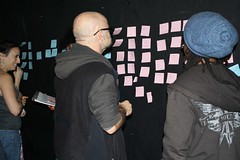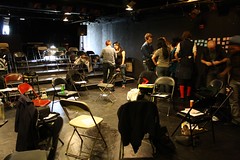 Maya Millett A group of artists gather at East Fourth Street’s WOW Cafe Theater and study the “Haves” and “Needs” wall they created at a networking event hosted by bartering website OurGoods.org. Bartering has enjoyed a resurgence in the neighborhood in the wake of the recession.
Maya Millett A group of artists gather at East Fourth Street’s WOW Cafe Theater and study the “Haves” and “Needs” wall they created at a networking event hosted by bartering website OurGoods.org. Bartering has enjoyed a resurgence in the neighborhood in the wake of the recession.The concept of bartering often conjures an aura of myth: Jack’s storied magic beans, as it turned out after all, was a pretty fortuitous trade for the cow he handed over to the butcher in exchange.
In the wake of the recession, bartering has captured a renewed interest among the cash-strapped or habitually thrifty. In its most recent incarnation, bartering thrives on the Internet. Craigslist, that great Wild West of an online forum, is a barterer’s goldmine. And niche websites like Swap Tree, Neighborgoods, ThingHeap, and countless others are tailored to specific trade interests like tools, books, electronics, furniture and other miscellany.
While the web has ushered bartering into a new era of resource exchange, in artistic communities like the East Village, swapping creative work or services has long been an inherent part of the culture.
“Probably everyone in the low-budget artist class in the East Village has bartered,” says Ayun Halliday, an author and Bust magazine columnist who in 1996 created the cult-coveted “East Village Inky” zine, which chronicles her adventures in motherhood.
Though Ms. Halliday and her family moved to Boerum Hill in 2000, she’s still entrenched in the East Village’s creative scene. Zine publishers, she says, are some of bartering’s most famous traders. Zine making “is definitely a labor of love — and barterers are often purveyors of that.”
In addition to using bartering as a promotional tool to increase the visibility of her zines, Ms. Halliday, 45, who is also a licensed massage therapist, often trades massage services or zine copies for activities that would otherwise be financially out of reach. It was the barter with a summer camp for her children that resulted in Ms. Halliday’s most gratifying — and ongoing —barter to date. In exchange for zine-making lessons and outdoor work help at the camp, her children’s tuition was waved.
For five weeks out of the year she could be a child again, immersed in nature and the invaluable experiences she’d gained with the counselors and other camp families. “By my calculation, my life is at least 100 wonderful people richer than it would have been if this barter had not transpired.”
Those human relationships that form within the process of a trade, Ms. Halliday said, are often as rewarding as the trade itself. “When there’s this momentum of good feelings happening, bartering just increases and everyone goes home with a wonderful basket of memories,” she said.
Artists Jen Abrams, 39, and Caroline Woolard, 27, share Ms. Halliday’s humanistic bartering philosophy. Together the women make two of the five co-founders of OurGoods.org, an online bartering site specifically geared toward the creative community. New members set up profiles and through a system of “Haves” and “Needs”, detail specifically what they’re seeking and what they have to offer to trade. Few skills are off limits; members share a wide array of expertise — from web design to cookie baking to construction.
The hope is that not only will people benefit from an experience achieved through cashless means, but that they’ll also widen their career circles as well. “We can respect each other because we know how hard it is to get our work done without cash and hopefully more connections can be made in bigger networks,” Ms. Woolard said. She often offers her homemade work dresses (“It’s between an apron and a tool belt”) for services like sewing and tailoring lessons, and calls on the help of OurGoods members with web and media savvy skills and connections to help expand her burgeoning utilitarian dress business.
On a recent Sunday afternoon, the two women held a bartering network event at WOW Cafe Theater’s loft space at 59 East Fourth Street, the oldest running all-women theater collective in the country. The theater, its acronym stands for Women’s One World, is built on a derivative of bartering called sweat equity, where members earn the right to put on their own shows in the space for free by working on other members’ productions. It’s a familiar concept for Ms. Abrams, who’s been involved with the group for 10 years and had to work on another member’s show in order to reserve a space for the workshop.
Participants at the live barter offered a smorgasbord of skills to trade — psychic healing and ukulele lessons, bookkeeping and graphic design consultations. Theater director Miriam Eusebio, who was seeking help with a play she was looking to produce, even offered: “I make a mean chocolate cake!” Here, talents are currency, and all were concerned about how best to maximize the experience for a potential barter partner.
“I’m personally really interested in a more humane way of determining value that includes people’s whole selves,” Ms. Abrams said. Bartering, she explains, is more akin to relationship building than simple transactional exchange. Swap partners must come together to agree on the value of the skills each person is offering, be clear about — and work through —expectations, and trust that the other person will not only hold up their end of the deal, but put in an equal amount of effort.
“Money won’t push you to grow as a person the way that barter does,” Ms. Abrams said, describing the process as often an act of self-growth.
Ms. Woolard added, “And to have optimism about strangers is a good thing sometimes.”




